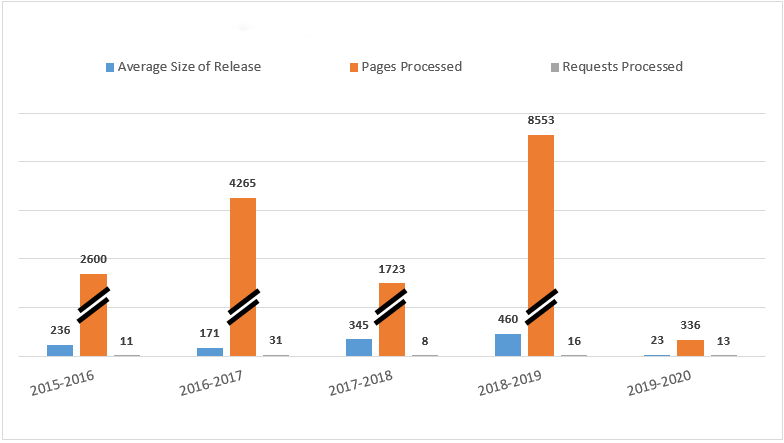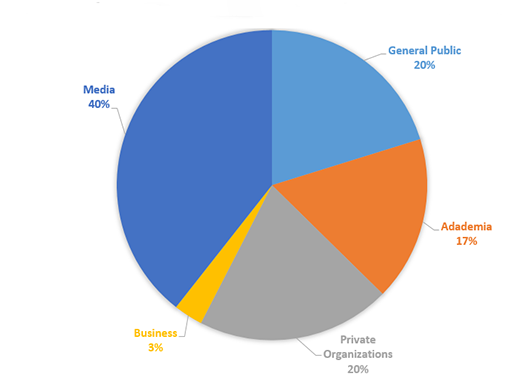Annual Report - Access to Information Act
April 1, 2019 – March 31, 2020
Introduction
The Access to Information Act gives Canadian citizens the legislated right to access information in federal government records, subject to certain limitations and specific exemptions. The Act complements other methods for obtaining government information, and does not limit in any way the access to federal government information that is normally available to the public upon request.
This report is prepared by the CIHR in accordance with section 94 of the Access to Information Act and section 20 of the Service Fees Act and is tabled in Parliament by the Minister of Health in accordance with the aforementioned section. It describes how the Canadian Institutes of Health Research fulfilled its responsibilities under the Act during the fiscal year beginning April 1, 2019 and ending March 31, 2020.
The Canadian Institutes of Health Research (CIHR) was created in 2000 under the authority of the CIHR Act as the Government of Canada’s health research investment agency. The mandate of CIHR as stated in the Act is:
To excel, according to internationally accepted standards of scientific excellence, in the creation of new knowledge and its translation into improved health for Canadians, more effective health services and products and a strengthened Canadian health care system.
CIHR is the largest funder of health research in Canada. Composed of 13 “virtual” Institutes and two business portfolios, CIHR provides leadership and support to over 13,000 world-class researchers from all pillars of health research and from all regions of Canada.
Organizational Structure
CIHR is led by a President and a Governing Council comprised of up to 18 members appointed by Order-in-Council. The Governing Council sets the overall strategic direction and goals. It establishes Health Research Institutes and determines the mandate of each. As outlined in the legislation, the Governing Council is responsible for developing its strategic direction and goals; evaluating its performance, approving its budget; establishing a peer review process for research proposals submitted to CIHR; approving funding for research; approving other expenditures to carry out its objective; establishing policies; and dealing with any other matter that the Governing Council considers related to the affairs of CIHR.
The Access to Information and Privacy (ATIP) Office, part of Corporate and Government Affairs, administers the provisions of the Access to Information Act and the Privacy Act for the CIHR and is accountable to the President of CIHR. The ATIP Office, which is comprised of 1 ATIP Coordinator and 1 Junior ATIP Officer, is responsible for the following activities:
- managing all response to both formal and information requests made under both Acts;
- developing policies, guidelines and procedures with respect to fulfilling the Agency’s legislative requirements of both acts;
- promoting awareness of both acts, delivering training, and providing advice and guidance to ensure that employees and management understand their roles and responsibilities;
- monitoring compliance with both acts;
- participating in and contributing to the broader ATIP community of practice;
- preparing annual reports for tabling; and,
- updating the CIHR Info Source chapter annually.
In accordance with the Access to Information Act, an area on the premises of this institution has been designated as a public reading room. This can be found at 160 Elgin Street, 9th floor, Ottawa, Ontario.
CIHR was not party to any service agreements under section 96 of the Access to Information Act during the 2019-2020 reporting period.
Delegation of Authority
The President of CIHR, as designated Head of CIHR under the Access to Information Act, exercises powers entrusted to the position by the Act, such as exemptions and exclusions.
In accordance with his authority under Section 73, the President has designated the Executive Vice-President; the Associate Vice President, Government and External Relations; the Director General, Corporate and Government Affairs; the Access to Information and Privacy (ATIP) Coordinator and one Junior ATIP Officer to exercise his powers, duties or functions under the Act (See Appendix A - Delegation Order).
Highlights of the Statistical Report 2018-2019
During the April 1, 2019 to March 31, 2020 reporting period, CIHR received 16 requests and had two requests carried over from the previous fiscal year, for a total of 18 requests. Out of these 18 requests, 13 were treated in the 2019-2020 fiscal year and five were carried over to the next fiscal year. The CIHR was consulted on 21 requests from other federal institutions however, no consultation requests were received from external organizations.
Formal requests tend to be concerned with the administration of daily activities of the CIHR.
-
Formal Requests
A total of 18 requests were received during this reporting period, 13 of which were processed. (See Appendix B - Statistical Report). Of the 13 requests completed, six were completed within the first 30 days of reception, seven requests were completed within 31 – 120 days, and there were no requests that required more than 121 days to complete. Three of the 13 requests treated in 2019-2020 were disclosed in full, while seven were disclosed in part, one request had no existing records, and two requests were abandoned by the requestor. A total of 363 pages were processed and 298 pages were disclosed in 2019-2020. During this period, 46.13% of requests were processed within the legislated time limit, compared to 68.75% in 2018-2019 and 37.5% in 2017-2018. Seven extensions were required due to workload (5 requests) or external consultations (2 requests). This represents extensions for 53.85% of all requests processed during the reporting year, compared to 31.25% for 2018-2019.
While the number of requests received is comparable to the previous year at 18, the average number of pages released per request decreased significantly, from 460 in 2018-2019 to 23 in 2019-2020, despite the fact that the subject matter of the requests remained similar to previous years. This decline in the size of records released, however, hides the fact that the requests received were highly complex in nature, requiring a high level of effort to process. Furthermore, the requests that needed to be carried over for processing in the 2020-2021 reporting period amount to over 8,000 pages. As illustrated in the graph below, the average number of pages released in 2019-2020 was 23 pages compared to an average of 460 pages in 2018-2019 and 345 pages in 2017-2018.
Access to Information Requests

Access to Information Requests - Long Description
2019–20 2018–19 2017–18 2016–17 2015–16 Average Size of Release 23 460 345 171 236 Pages Processed 336 8553 1723 4265 2600 Requests Processed 13 16 8 31 11 In response to the Government of Canada’s commitment to open government access and transparency, CIHR continues to make documents available to the public on an Open Government portal.
-
Informal Requests
In 2019-2020, CIHR had no informal ATI requests, whether from the general public, or other sources.
-
Sources of Requests
In 2019-2020, although 31% of request sources declined to identify themselves, 25% of requests were received from the media, 25% were from private organizations, 12.5% were from the business/private sector and 6.25% were from the public. As illustrated below, the source of requests received has been consistent over the past five years.
Since 2015-2016 the general public has been the source of 20 requests and academia has been the source of 17 requests. ATI requests have also been submitted by twenty organizations and three businesses. The largest source of requests since 2015-2016 has been from the media with 39 requests, representing 39.39% of the total requests.
- Media - 40%
- General Public - 20%
- Academia - 17%
- Private Organizations - 20%
- Business - 3%
-
Consultation Requests
During the 2019-2020 reporting period, the CIHR Access to Information and Privacy Office received 21 consultation requests from federal departments, which is a slight decrease from the 29 consultations received in the previous fiscal year, and no requests were received from other organizations. Eighteen consultations were recommended for full disclosure and three were recommended to be disclosed in part.
The volume and nature of the consultations received from other government sources tend to be similar to those of requests for information CIHR receives on an annual basis, focusing primarily on CIHR programs and initiatives. Due to the fact that there is generally more information being proactively disclosed it is therefore not unexpected to see more variation in the volume of consultations.
Additionally, the ATIP office provided internal advice, guidance and recommendations on a variety of Access to Information issues related to CIHR programs and initiatives.
-
Processing Requests
The CIHR makes every possible effort to process requests within the 30-day time limit as required by the legislation. However, some delays may be incurred when requests received by CIHR contain third-party information, which triggers the requirement for consultations, or when a significant volume of records must be treated for a request.
In 2019-20, seven requests required an extension: five of which were due to interference with operations/workloads, and the remaining two extensions required external consultations.
-
Fees and Costs
The Access to Information and Privacy Office collected $80 in application fees over the 2019-2020 fiscal.
During that same period, the Access to Information and Privacy Office incurred $87,500 in salary costs to administer the Access to Information Act. Owing to the difficulty of tracking all of the operational costs related to the administration of the Act, the costs and person year usage statistics are conservative estimates. Almost all costs are attributable to salary, and include fractions of the salaries of the directors, managers and employees who participated in work related to the Act.
Sources of ATI Requests Submitted Between 2015-2016 and 2019-2020

Sources of ATI Requests Submitted Between 2015-2016 and 2019-2020 - Long Description
Training Activities
Several training activities were undertaken during this reporting period, including Bill C-58 proactive disclosure and generalized ATIP training. The ATIP Office offers general and on demand training to all staff.
The ATIP Coordinator attended the ATIP Coordinator and Practitioner Community meetings hosted by the Treasury Board Secretariat throughout the fiscal year, and also participated in online professional communities on GC Connex. These communities provide valuable information on trends and best practices within the ATIP community, updates on recent complaints and court cases, and tools to help improve service standards within the field.
The ATIP Office continues to develop educational tools and deliver training sessions to CIHR staff.
Policies, Guidelines and Procedures
While there were no significant revisions to current access to information policies, guidelines or procedures, the CIHR implemented some new access to information processes for Privacy Impact Assessments, privacy breach reporting and Proactive disclosure in response to Bill C-58 Amendments during the 2019-2020 reporting period.
Complaints and Investigations
The CIHR received 6 complaints during the reporting period and 2complaints were carried over from previous years. During the course of 2019-2020 period, three complaints were concluded: one complaint was resolved and two complaints were deemed to be not well founded. The five remaining complaints remain active and are carried over to 2020-2021.
Monitoring Process
The ATIP Office monitors the time to process requests and administer the Access to Information Act through weekly verbal status reports and a weekly written status report is provided to the Health Minister’s Office for their information. Any issues of significant interest are discussed with the President and Communications department on an as needed basis.
- Date modified: